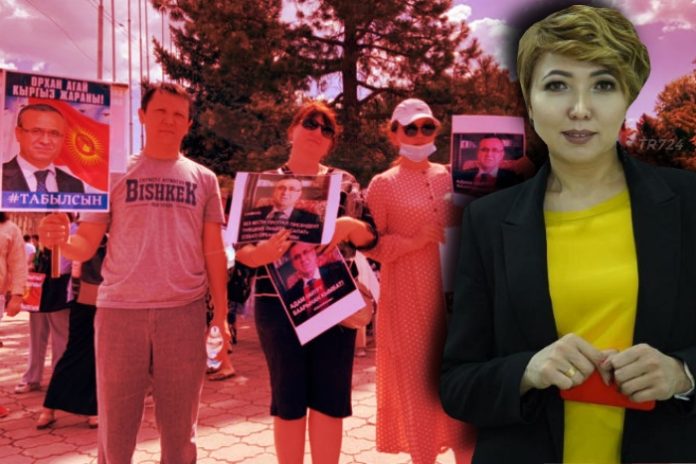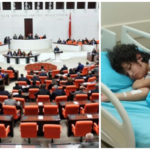The Kyrgyzstan State Committee for National Security (GKNB) seized video recordings from a cafe where Orhan İnandı, who is allegedly being held against his will in the Turkish Embassy in Bishkek, was seen talking with former Interior Minister Melis Turgunbaev, the Tr724 news website reported.
According to Taalaygül Toktakunova, the attorney for the İnandı family, they were able to find photographs of the cafe where İnandı is seen talking to Turgunbaev and two suspicious looking men on May 31, the day he disappeared. “We went back to the cafe to request the footage from that day to understand what was going on,” she said. “But we were told the recordings were taken by the GKNB and that there were no copies.”
İnandı, the founder and president of the Turkish-Kyrgyz Sapat school network operating in Kyrgyzstan, went missing in Bishkek on the evening of May 31 and is feared to have been abducted by Turkey’s National Intelligence Organization due to his alleged links to the Gülen movement, a faith-based group inspired by Muslim cleric Fethullah Gülen.
Toktakunova said she made a request to the prosecutor’s office for the removal of the GKNB from the investigation team. According to Interior Ministry Press Secretary Adinay Şarşeyeva, there are currently more than a thousand policemen involved in the search for İnandı.
Kyrgyzstan had previously denied an extradition request from Turkey for İnandı, which was conveyed through diplomatic channels in 2018, Deputy Interior Minister Nurbek Abdiev said in a parliamentary hearing held on Wednesday.
İnandı’s wife, Reyhan İnandı, said in a June 6 statement that an undisclosed source told her that her husband was being held against his will at the Turkish Embassy, and she claimed he was being tortured to renounce his Kyrgyz citizenship. This would simplify İnandı’s forcible transfer to Turkey, she said.
Toktakunova previously shared records from a dashcam in İnandı’s car showing suspicious individuals who could have been involved in his disappearance, which occurred right after a meeting with the former minister, who took a trip outside Kyrgyzstan soon after İnandı went missing.
Turkish President Recep Tayyip Erdoğan has been targeting followers of the Gülen movement, inspired by US-based Turkish Muslim cleric Fethullah Gülen, since the corruption investigations of December 17-25, 2013, which implicated then-Prime Minister Erdoğan, his family members and his inner circle.
Dismissing the investigations as a Gülenist coup and conspiracy against his government, Erdoğan designated the movement as a terrorist organization and began to target its members. He intensified the crackdown on the movement following an abortive putsch on July 15, 2016 that he accused Gülen of masterminding. Gülen and the movement strongly deny involvement in the coup attempt or any terrorist activity.
Kyrgyz citizens, politicians and NGOs continue calling on the country’s authorities to take all possible steps to ensure İnandı’s safety. The protesters have expressed their intent to continue their demonstrations until İnandı is released and allowed to return home.
Since June 1 protests have taken place in Berlin, London, Oslo and Brussels as well as Bishkek in support of the Turkish educator, demanding his release. The United Nations Human Rights Committee has called on Turkey to promptly take all measures necessary to establish the whereabouts of İnandı and said the government should ensure that İnandı would not be subjected to torture and inhuman treatment, guarantee his physical and mental integrity and immediately place him under the protection of the law.
Rights organizations have also asked Kyrgyz authorities to exert efforts for the release of İnandı. Human Rights Watch (HRW) called on Kyrgyz authorities to investigate the disappearance of İnandı and “ensure his safety and that he is not unlawfully removed to Turkey.” According to HRW, allowing İnandı’s rendition to Turkey would violate Kyrgyzstan’s obligations under the Convention against Torture and Other Cruel, Inhuman, or Degrading Treatment or Punishment, which it ratified in 1997.
In a joint letter UN rapporteurs accused the Turkish government of engaging in the systematic practice of state-sponsored extraterritorial abductions and forcible returns to Turkey, with at least 100 Turkish nationals from multiple states including Afghanistan, Albania, Azerbaijan, Afghanistan, Cambodia, Gabon, Kosovo, Kazakhstan, Lebanon and Pakistan removed to Turkey.
In a number of cases the UN Working Group on Arbitrary Detention (WGAD) concluded that the arrest, detention and forced transfer to Turkey of Turkish nationals were arbitrary and in violation of international human rights norms and standards.
A recent report by Freedom House on global transnational repression also revealed the intensity, geographic reach and suddenness of the Turkish government’s campaign targeting dissidents abroad, noting that Turkey has become number one among countries that have conducted renditions from host states since 2014.
Source: Stockholm Center for Freedom (SCF)



